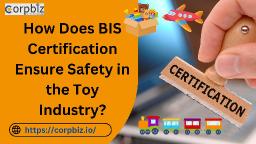

Toys are a big part of every child's life. They bring joy, help children learn, and keep them entertained. But toys must also be safe. Unsafe toys can harm children and cause accidents. That is why the government of India has made BIS Certification for Toys mandatory. This certification helps ensure that toys sold in India are safe for children to use.
In this blog, we will explain how BIS Certification helps maintain safety in the toy industry, what the certification process includes, and why manufacturers need to get certified.
What Is BIS Certification?
The Bureau of Indian Standards (BIS) is the national standards body of India. It works under the Ministry of Consumer Affairs. BIS sets quality and safety standards for different products, including toys. When a toy gets a BIS certification, it means the toy meets the safety and quality standards set by BIS.
There are different types of BIS registration, such as:
For toys, ISI Mark Registration in India is mandatory. Without the ISI mark, toys cannot be sold in the Indian market.
Why Is BIS Certification for Toys Important?
Children are sensitive. Their toys should be free from harmful chemicals, sharp edges, or small parts that can cause choking. Many times, low-quality toys made from poor materials can lead to health risks or accidents.
Here’s how BIS Certification for Toys helps:
What Is ISI Mark Registration in India?
The ISI Mark is a symbol of quality and safety. It shows that a product has been tested and certified by BIS. For toys, having an ISI mark is compulsory under Indian law.
The ISI mark on toys means:
Without an ISI mark, toys are considered illegal in India. Whether the toy is made in India or imported, it must have the ISI mark.
BIS Registration in India: Process for Toy Manufacturers
Toy manufacturers, whether Indian or foreign, must follow the BIS Registration in India process to get certified. Here’s a step-by-step guide:
Manufacturers must apply online on the BIS portal. They need to fill in details about the company, product, and manufacturing unit.
The toys are sent to a BIS-recognized lab for testing. The lab checks the toy’s quality, safety, material, strength, and other factors.
A BIS officer visits the factory to see how toys are being made. They inspect machines, raw materials, and quality control systems.
If everything meets BIS standards, a license is issued, and the manufacturer can put the ISI mark on their toys.
Even after certification, BIS can do random checks to make sure the toy quality is still good.
BIS CRS Certification in India: For Electronic Toys
Many toys today are battery-operated or electronic. These toys need BIS CRS Certification in India under the Compulsory Registration Scheme (CRS).
Under CRS:
So, electronic toys need both ISI and CRS certifications if applicable.
Rules for Importers
Not just Indian companies, but even foreign toy brands need BIS Certification for Toys if they want to sell in India. They must:
This rule helps prevent low-quality, unsafe toys from entering the Indian market.
Penalty for Non-Compliance
If a toy is sold in India without BIS certification or ISI mark:
So, it's important for everyone in the toy business to follow BIS rules.
Conclusion
Toys should bring happiness, not harm, to children. BIS Certification for Toys plays a key role in ensuring this. By making ISI Mark Registration in India mandatory, the government protects children from unsafe and poor-quality toys.
Whether you are a toy manufacturer, importer, or seller, getting BIS Registration in India is not just a legal need—it is your responsibility. If your toy has BIS CRS Certification in India and an ISI mark, parents will trust your product more, and children will enjoy their toys safely.
Looking for help with BIS Certification for Toys?
Get in touch with our Corpbiz experts today to simplify the process of BIS Registration in India and ensure your toys meet all safety standards.
| No comments yet. Be the first. |